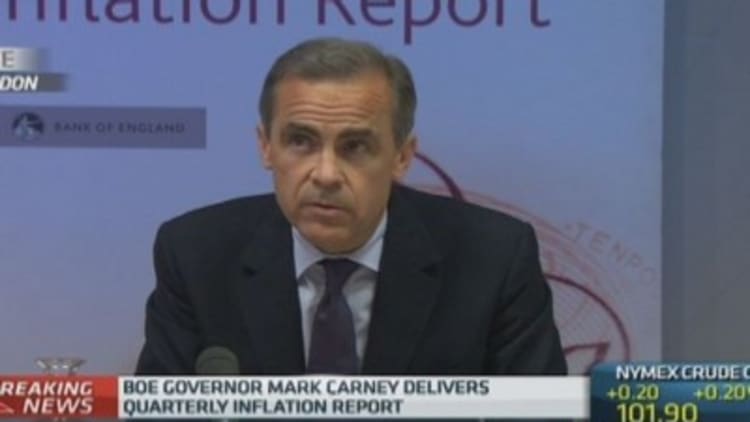
Bank of England (BoE) Governor Mark Carney played down expectations of an earlier-than-expected rise in interest rates on Wednesday, despite signs of a pickup in the U.K.'s economic recovery.
Speaking at a press conference following the publication of the BoE's quarterly inflation report, Carney said a hike in rates would depend on the degree of slack in the U.K. economy, and the prospects for its absorption.
"The economy has edged closer to the point at which the bank rate will need—gradually—to rise," Carney said, but stressed that discussions of timings should be kept "in perspective."
Read MoreSterling hits 1-month low on BoE inflation report
The BoE indicated that a rate hike could come towards the end of the first quarter of 2015, or the beginning of the following quarter, although it stressed that when it did happen, the rise would be gradual.
The inflation report follows calls from some for interest rates to rise soon, given a string of data releases suggesting the U.K.'s economy is picking up steam.
Carney, however, called on a sporting analogy to illustrate his thoughts on the U.K. recovery.
"Securing the recovery is like making it through the qualifying rounds of the World Cup—it's a major achievement, but it's not the end goal," he said.
Ben Brettell, economics editor at Hargreaves Lansdown financial services firm, said Carney had continued to "walk the tightrope between talking up the U.K. economy and dampening expectations that interest rates will rise."
"Unless inflation expectations really start to take off, the BoE will judge that there is enough slack in the economy to keep rates on hold for a while yet," he said in a note.
"They will need a clear and unequivocal reason to raise them, as the risks of tightening too early are substantial."
Forecasts unchanged
In its inflation report, the Bank of England kept its U.K. growth and inflation forecasts broadly unchanged, although lowered its expectations for unemployment.
Read MoreUK jobless rate hits lowest in more than 5 years
It predicted inflation will reach its target of just-below 2 percent in two years' time. This March, consumer prices rose only 1.6 percent year-on-year—the lowest increase seen in four years.
The bank maintained its earlier forecast of growth of 3.4 percent in 2014. However, it forecast that joblessness would fall faster than previously expected, to 5.9 percent in two years' time. Earlier predictions suggested that joblessness would stand at 6.4 percent in two years' time.
Earlier on Wednesday, official data revealed that U.K. unemployment fell to 6.8 percent in the first quarter of this year. This was its lowest level in over five years.
Wage growth—including bonuses—rose at a faster rate than inflation. However, wage growth was less than expected, and excluding bonuses, was lower than in the previous quarter.
Nonetheless, the joblessness data come against a brightening picture of the U.K. economy. In the first quarter of this year, Britain posted gross domestic product (GDP) growth of 0.8 percent quarter-on-quarter. In addition, figures published Friday revealed that manufacturing output continued to grow in March, while a pickup in exports meant the trade deficit narrowed.
Read MoreGreat Recession over as UK nears pre-crisis peak
Last week, the BoE opted to leave left interest rates and asset purchases unchanged at its monthly monetary policy meeting.
However, Howard Archer, chief U.K. economist at IHS Global Insight, said the more hawkish members of the BoE's Monetary Policy Committee could start to push for a small rate hike before the end of the year.
"Debate within the Bank of England over when interest rates should start to rise is likely to become increasingly intense," Archer said in a research note.
"We currently maintain the view that interest rates are still most likely to start edging up in the second quarter of 2015, although there is clearly a growing likelihood that the Bank of England could act before then."


